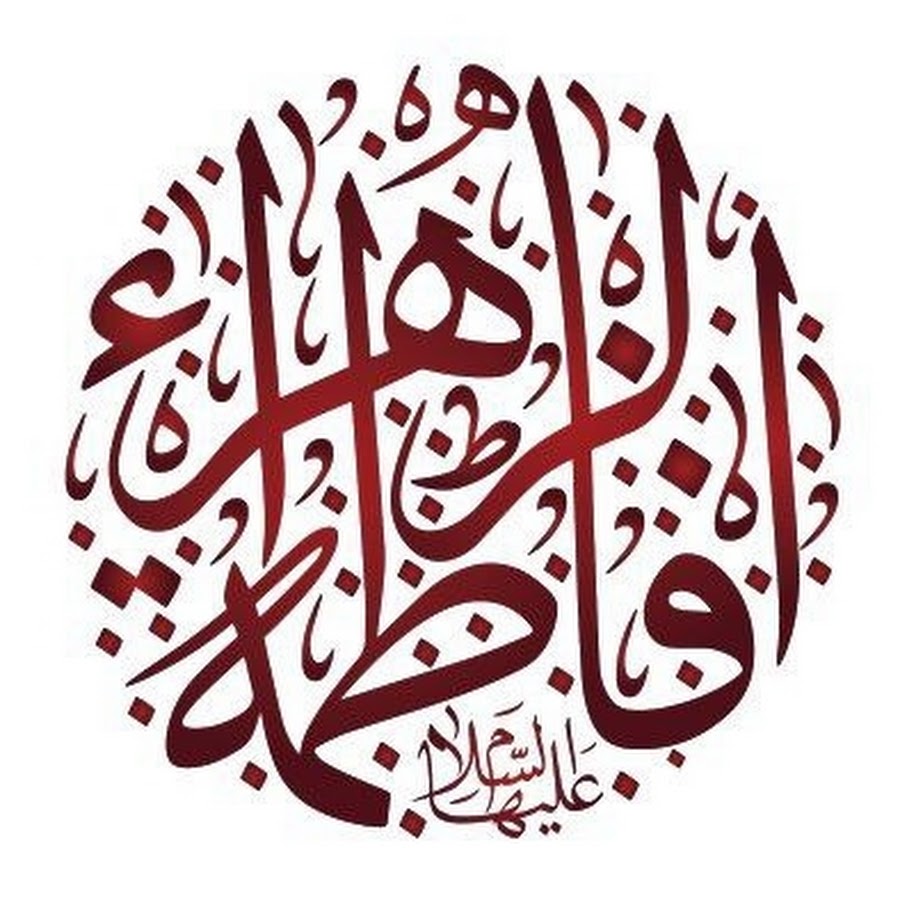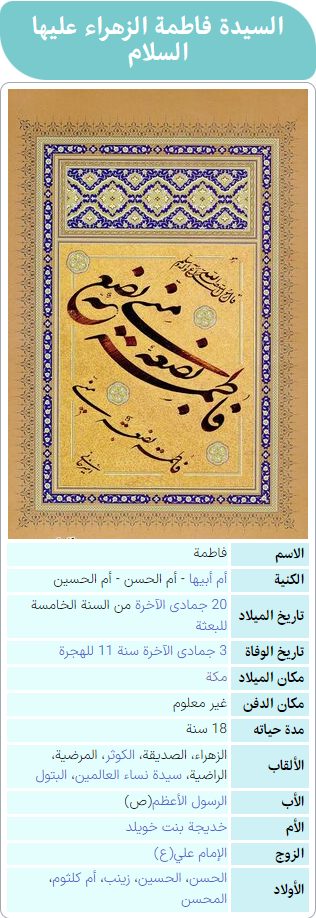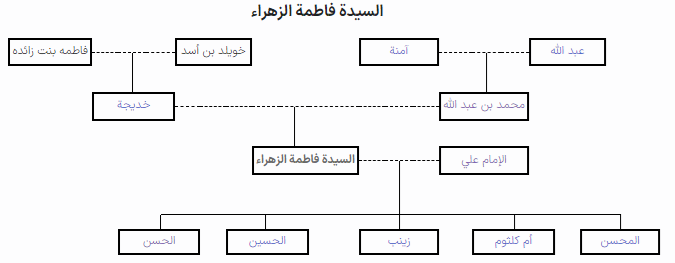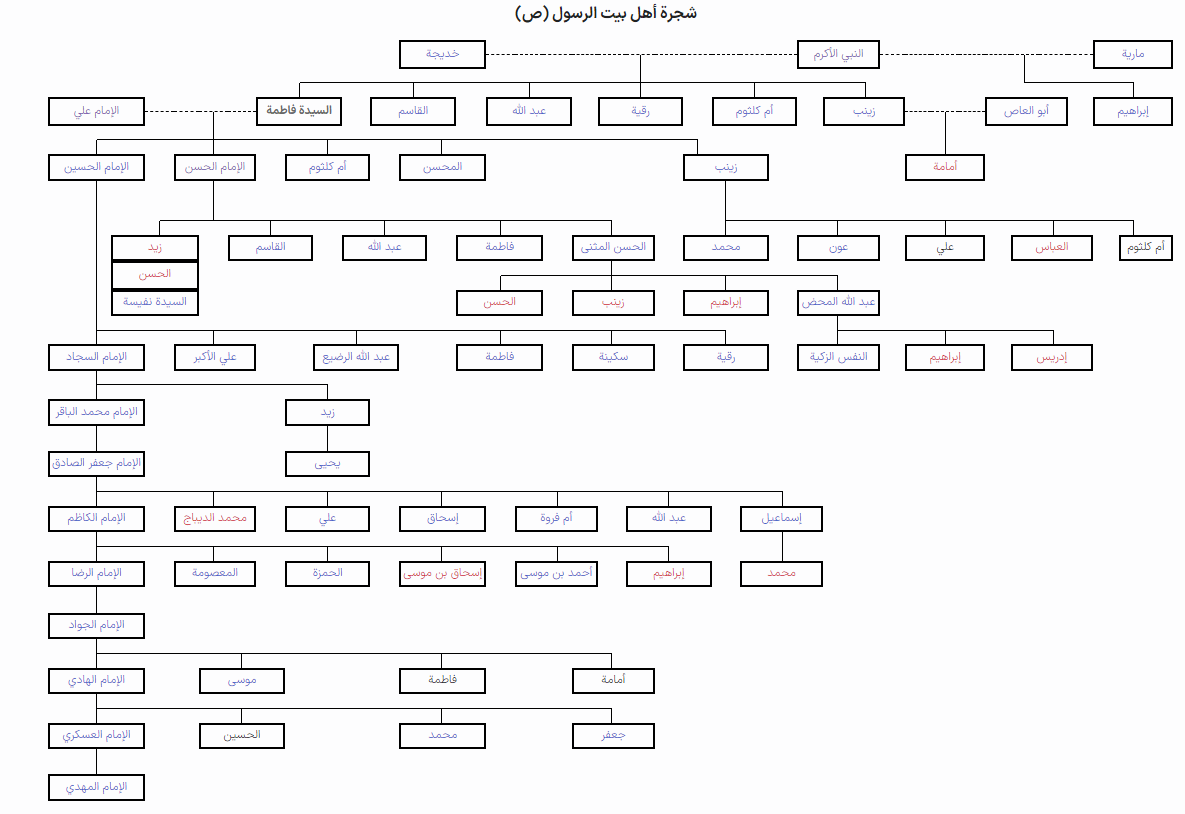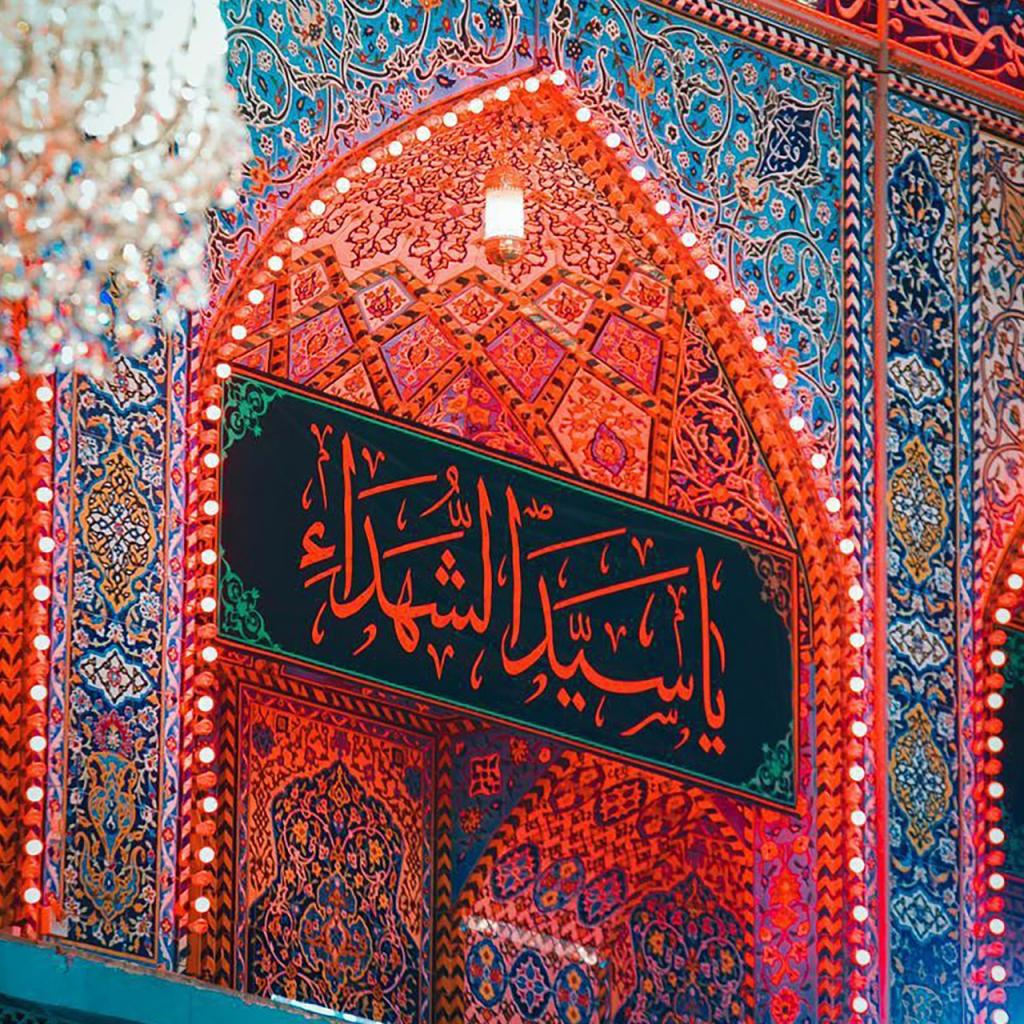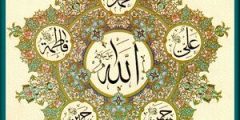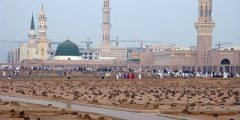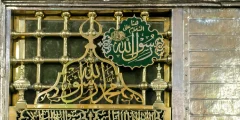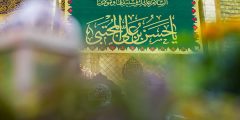Lady Fatima Al-Zahra, peace be upon her, (5 for the mission - 11 AH) girl The Prophet MuhammadHer mother, Mrs. Khadija, and her husband Imam AliAnd she is one of them The five owners of the clothing, whom the Imamis believe in their infallibility. And from her children Imam Hassan، And HusseinAnd Zainab, the only woman he accompanied Prophet (PBUH) For the Mubahala Christians of Najran.
Surah Al-Kawthar singled it out, included verses of purification and feeding, and hadiths about its right and virtue were mentioned in Hadith: If it were not for you and the few. Her father considered her a part of himself, and her anger was God’s anger and her satisfaction was His satisfaction.
There was not much news about Lady Fatima’s childhood and later stages. What was reported was her accompanying her father in confronting the polytheists and their harm to him, her presence in the people of Abu Talib, and her migration to Medina under the auspices of Imam Ali.
After her migration to Medina, despite the large number of people who proposed to her, she married Imam Ali in the year 2 AH. Among her social activities after the migration was her accompanying the Prophet in some battles, including the conquest of Mecca.
After the death of the Messenger of God, he pledged allegiance to Abu Bakr in Saqifa on the condition that he would be the caliph over the Muslims, but Al-Zahra’ refused the pledge of allegiance. When she saw it as a violation of the Pledge of Allegiance of Al-Ghadir, in which the Prophet confirmed that Ali bin Abi Talib would succeed him to take over the affairs of the Muslims. Fatima was prevented from inheriting, as well as from disposing of the money that the Prophet had allocated to her in the Fadak case, and accordingly she delivered a sermon known as the Fadak sermon.
She was injured during the storming of her house by Abu Bakr’s supporters on his orders and under the supervision of Omar bin Al-Khattab to take the pledge of allegiance from Imam Ali Among those who were with him in the house forcefully - and that was shortly after her father’s departure - which forced her to bed in the last period of her life, until this led to her death on the 3rd of Jumada al-Akhirah in the year 11 AH. Her body was buried at night, at her secret request.
Read also:Who are the people of Lot?Al-Zahra’s praises are mentioned that the Great Prophet taught her, and the Qur’an of Fatima, which includes divine revelations that Fatima received, and its collection. Imam Ali In a newspaper, which was circulated by the imams from her generation to the owner of the era, as the Shiites believe.
Her titles include: Al-Zahra, Al-Batoul, Lady of the Women of the Worlds, and her nicknames include her father’s mother and the mother of the imams.
They expressed the memory of her martyrdom under the title of the days of Fatimiyah, and the names “Fatima” and “Al-Zahra” are among the preferred names for naming females among families in Shiite circles.
Name, surname and nickname
She is Fatima Bint Mohammed bin Abdullah The Prophet of Islam and her mother Khadija bint Khuwaylid. They counted many titles for her, amounting to approximately 30 titles. Each one of them has its own meaning. Among the most famous of these titles are: Al-Zahra, Al-Siddiqa, Al-Muhaddithah, Virgin، Lady of the women of the worlds, Mansoura, Radia, and Mardiya. She also carried some nicknames: her father’s mother, mother of the imams, mother Al Hassan and mother ELHussein And the mother of the philanthropist.
What is famous is that the Prophet called her “Fatima.” Because God weaned her and her lovers or her offspring and children from the Fire. And her most famous nicknames Al-ZahraIt is often called by that name, and it is sometimes combined with its name, so it is said Fatima Alzahraa, That is: bright light and brilliant light.
Life of Zahra
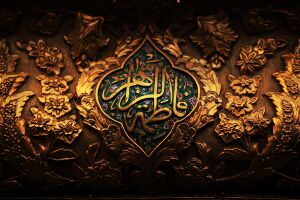 | |
| 20 Jumada al-AkhiraYear 5 AH | her birth |
| Ramadan 10Year 10 of the mission | The death of her mother, Khadija Al-Kubra |
| Late month of SafarYear 2 AH | Hold it Ali bin Abi Talib |
| 1 Dhu al-HijjahYear 2 AH | Her marriage to Ali (peace be upon him) and the beginning of their shared life |
| Ramadan 15Year 3 AH | The birth of Al-Hasan (peace be upon him), the eldest of her children |
| Shawwal 7Year 3 AH | Her presence after Uhud to bandage the Prophet’s (PBUH) wounds. |
| 3 ShaabanYear 4 AH | The birth of Al-Hussein (peace be upon him), her second son |
| 5 Jumada al-AwwalYear 5 or 6 AH | The birth of her eldest daughter, Zainab |
| Year 6 AH | The birth of her second daughter, Umm Kulthum |
| Year 7 AH? | The Prophet (PBUH) granted Fadka to her |
| 24 Dhu al-HijjahYear 9 AH | With the Messenger of God in the Mubahala |
| 28 zeroYear 11 AH | Departure of the Prophet (PBUH) |
| Rabi' al-AwalYear 11 AH | Fadak was confiscated by order of Abu Bakr |
| Rabi' al-AwalYear 11 AH | Delivering the Fadakiya sermon in the Mosque of the Prophet (PBUH) |
| Rabi' al-AwalYear 11 AH | The building of the House of Sorrows in Al-Baqi’ by Ali (peace be upon him) so that Al-Zahra’ could hold the funeral for her father there |
| second springYear 11 AH | The attack on Al-Zahra’s house, her wounding, and her son Al-Mohsen being thrown away |
| 13 Jumada al-Awwal or3 Jumada al-Akhirah Year 11 AH | Certificate |
Al-Zahra is considered the fourth or fifth - according to one opinion - of the Prophet’s children, and her mother, Mrs. Khadija, was the first of the Prophet’s (PBUH) wives. Historians have unanimously agreed that her birth was in Mecca, specifically in the house of Lady Khadija, which is located in Al-Attarin Alley and Al-Hajar Alley near Al-Massa’.
Read also:The story of Goliath and GoliathBirth and upbringing
Shiite sources recorded her birth on the 20th of Jumada al-Akhirah. According to their prevailing opinion, Al-Zahra was born in the fifth year of the Prophet’s mission. What is proven among the Sunnis and the community is that her birth was five years before the mission. Al-Mufid and Al-Kafami confirmed it in the second year of the mission.
Due to the lack of historical texts about Fatima’s childhood life - until the period before her marriage to BImam Ali (peace be upon him)It is difficult to identify the details of her life at this stage. She was a witness to the arbitrary actions imposed by the Quraish polytheists directed at her father Muhammad bin Abdullah (PBUH)This happened after the prophetic call became public. In addition, it was only a few years into her childhood that he entered Banu Hashim And supporters of the Prophet in the circumstances of the comprehensive boycott, during the days of the people of Abu Talib.
She also lost her mother during her childhood, and Abu Talib, her father’s uncle - who was the first lawyer of the Prophet (PBUH) after the death of his grandfather Abdul Muttalib - moved away. Among the most important events at this stage was the Quraysh conspiracy to kill the Messenger, and the Prophet’s migration from Mecca to Medina at night, and consequently her migration with the other Fatimids to Medina following the migration of her father, under the auspices of Ali bin Abi Talib (peace be upon him).
Engagement and marriage
Historical sources mentioned that the senior companions proposed to her after the migration to Medina, but among them all, he was Ali He is the chosen one; To become a son-in-law to the Prophet.
Read also:Who are the people of the cave?Some see transmission Prophet To Medina and his leadership of the nation, the important factor in the prestigious position that the daughter of the Messenger of God enjoyed among Muslims. In addition to that, the special care that Fatima received from the Prophet, as well as her personal characteristics compared to the women of society at that time, was the catalyst for people’s initiative to propose to the daughter of the Prophet (PBUH).
Some of the Quraish leaders who were early converts to Islam, or who had money, came forward to propose to Lady Fatima. It was reported that Abu Bakr, Omar, and Abdul Rahman bin Awf also did this. None of them were accepted. Then the response would come from the Messenger to them: [O so-and-so], wait for the judgement. Or as some narratives mentioned, one of them said to another: “He is waiting for God’s command regarding it.”
In a situation where the Messenger swore to God that if there was anyone better among his family than Ali, he would marry her to him, and he said: “I am not your wife, but God has married you.” Some narratives say that Gabriel ordered the Messenger (PBUH) to marry her to Ali, as God had pleased her for him and for her.
Ibn Abi Talib - like all other immigrants - was going through difficult circumstances in the months that followed the migration to Medina, so he sold his armor in exchange for the dowry at the suggestion of the Prophet.
The contract took place in the mosque and people were present, and there were many statements about the history of the contract. The famous opinion is that its date is the second year of the Hijra, according to most sources.
The wedding was in the month of Shawwal or Dhul-Hijjah, in the second year of the Hijra, after the famous Battle of Badr, or in the third year after Uhud.
boys
The researchers agreed that both... Al Hassan، And HusseinZainab and Umm Kulthum are the children of Al-Zahra and Ali. Based on what was reported in Shiite sources and some Sunni sources, there is another son named Muhsin (or Muhsin) for Al-Zahra, which she brought up as a result of what she was exposed to shortly after her father’s death.
marriage life
Al-Zahra endured various trials during the beginning of her married life. They also mentioned that one time, she did not find food for three days and that Al-Hasnain was distressed by extreme hunger.
She shared household duties with her maid, Fadda, after the Prophet (PBUH) chose her to help her.
Fatima only treated her husband with appreciation and respect. She also used to address him as Abu Al-Hassan in the presence of others. The sources stated that Al-Zahraa was expressing her love for her husband, as is the case for... Ali (peace be upon him) towards her, and in response to a question directed by Messenger of God (PBUH) For them, Ali called her with the blessings of help in obeying God and she called him with the best Baal.
From the death of the Prophet to her death
History witnessed several events that happened to Al-Zahra in the recent period leading up to her death. They mentioned that she was deeply saddened by the death of her father, and they reported that they did not see her laughing after that. Among the most important incidents was the Saqifa incident, the seizure of the caliphate, followed by the usurpation of Fadak, which led to her delivering her Fadak sermon to the Companions.
She was threatened by the Caliph and his agents, which was embodied in the attack on her house (peace be upon him). It is also reported that one of the reasons for the attack was refusal Ali And the opponents of the caliphate of Abu Bakr, and their sit-in in the house of Fatima (peace be upon her), which led to her being injured as a result of her refusal to bring Ali to force him to pledge allegiance, and this caused her miscarriage.
At the end of her life, she recommended Ali (peace be upon him) That no one who had wronged her would witness her funeral, and that Abu Bakr and Omar would not pray over her, so Ali buried her at night and did not inform them of that, and based on the most famous sayings, she died on the third of Jumada al-Akhirah in the year 11 AH. Although there are many opinions about determining the duration of her life Messenger of God.
Virtues
Infallibility and purity
Shiites believe that Lady Zahra has the status of infallibility; Because it is one of the examples of the verse of purification, as God wanted purity and integrity for the People of the House (peace be upon him) from every impurity and defilement. According to many narrations transmitted by Shiites and Sunnis, Fatima is one of the symbols of the Prophet’s family (peace be upon him). The first historical narratives that stated her infallibility were the ones that reported the incident of Fadak, when her inheritance was taken away immediately after the death of the Prophet, and it is based on this. Imam Ali To the verse of purification to prove the infallibility of Al-Zahra, and through an explicit protest and argument against Abu Bakr, he denies this behavior, and in return supports the rise of Lady Fatima to recover Fadak and the lost rights.
Status with God and His Prophet
Messenger of God (PBUH):
«My daughter Fatima Mistress of the women of the worlds From the first and the last, and it is a part of me, and it is the light of my eyes.
Sheikh Al-Saduq, Al-Amali, p. 113; Al-Hamwi al-Juwayni, Fara’id al-Samatin, vol. 2, p. 35.
The Imami Shiites unanimously agreed that Al-Zahra tops the pure Imams - from her descendants - in rank and status, after her father. Messenger of God And her husband, Ali bin Abi Talib (peace be upon him) Narrative sources mentioned a holy hadith, known as the hadith “If it were not for you,” and it was reported in various forms, in one of which the creation of the heavens is entrusted with the creation of Fatima, the Messenger of God, and Imam Ali. It was narrated on the authority of the Prophet that he said: God becomes angry because of her anger, and He is satisfied when she is pleased.
Al-Zahra Al-Muhaddith
Affection in kinship
A few messengers
Of the braggarts
The descendants of the Prophet
The continuity of the Prophet’s lineage from the children of Fatima, and the establishment of guardianship among them as infallible, also indicates another aspect of her virtues. Commentators expressed their belief that the continuity of the Prophet’s descendants is the most prominent confirmation of Surat Al-Kawthar, which means abundant goodness. Among them is the position of divine imamate held by individuals from this tree. The angels also told her mother Khadija - when she was present at her birth and took care of her condition - that she and her descendants had been blessed.
Worship
On the authority of Fatima Al-Zahra (peace be upon her):
Whoever ascends to God in his sincere worship, God Almighty will send down to him his best interests.
Ibn Fahd Al-Hilli, Kit al-Da’i, p. 233.
The sources have mentioned their instances in worship and prayer, including what was reported about them in the event of reciting the Qur’an while the millstone was rotating without anyone touching it, quoting from Salman Al-Farsi, and from Ammar and Maimuna. When they transmit those scenes To the Messenger (PBUH) He used to say: God has angels traveling on earth entrusted with helping the family of Muhammad, or in another narration, he said: God knew the weakness of his nation, so He inspired the millstone to turn and it turned. It was also narrated that when she was busy with her prayers and worship, her son might have cried when he saw the cradle moving, and an angel was moving it.
In a narration by Al-Hasan Al-Basri, he describes Al-Zahra as the worshipper of this nation, who “used to stand until her feet swelled.”
Charity and prayers for others
Imam Al-Sadiq narrated on the authority of his ancestors on the authority of: Imam Hassan He said: I saw my mother Fatima getting up in her prayer hall on Friday night, and she remained kneeling and prostrating until the dawn pillar exploded, and I heard her praying for the believing men and women, naming them, and praying for them a lot, and not praying for anything for herself, so I said to her: O mother! Why don't you pray for yourself as you pray for others? She said: Son! The neighbor, then the house.
Many sources touched on the characteristics of the daughter of the Messenger of God, as she spent her money throughout her life with Ali (peace be upon him) While she did not enjoy the simplest necessities of life. Such as the narrations reported about giving her necklace to the questioner, and among these narrations is feeding the poor, the orphan, and the prisoner with everything they have at breakfast, on three consecutive days that they spent fasting, and Al-Hassan was two small children.
Socio-political attitudes
Among Al-Zahra’s social activities - after the migration to Medina - was nursing the Prophet following his wounds in the Battle of Uhud, and her presence in digging the trench - where she brought a piece of bread to her father, and said: I baked a loaf of bread, and I was not happy until I brought you this piece and conquered Mecca alongside her father. However, the main focus of her positions on political events relates to what followed the death of the Prophet (PBUH) in the short remaining period of her life, and in particular her confrontation with the first Caliph.
Some believe that many of Al-Zahra’s words and behavior that were issued after her father’s passing reflect her rejection of the actions of the Caliph and his aides who usurped her rights and the rights of the Prophet. Ali bin Abi Talib (peace be upon him).
The shed meeting and its outcome
Among those who disagreed with the Saqifa meeting, and denounced Abu Bakr as the successor to the Messenger, were Lady Fatima andAli (peace be upon him) Along with them were some companions, such as Salman, Al-Zubayr, Abu Dharr, and Al-Miqdad. They failed to pledge allegiance to Abu Bakr. This is based on what was The greatest messenger He had already done so, by appointment Ali Ibn Abi Talib As his successor and guardian after his departure, in several situations.
After the Pledge of Allegiance to the Shed, Ali used to go out and carry Fatima on an animal at night and pass by the Ansar’s gatherings asking them for support. People were expressing their regret and saying: “O daughter of the Messenger of God, our pledge of allegiance to this man has passed, and if your husband and your cousin had preceded us before Abu Bakr, we would not have done justice to him.” The question was coming from one side Ali (peace be upon him)How could he join the people and leave the body of the Messenger of God (may God bless him and grant him peace) at home without being buried, and compete for the caliphate?! Then Lady Al-Zahra supported his position, saying: “Abu Al-Hassan only did what he should have done.” So you refer them to God for what they have done, and He will hold them accountable later.
The protesters protesting against Abu Bakr
After death Messenger of God Some of the Ansar and Muhajireen gathered in the shed for the purpose of appointing the ruler. Ali (peace be upon him) remained in his house, and with him were some of the companions, including: Al-Abbas, Al-Fadl bin Al-Abbas, Al-Zubayr, Khalid bin Saeed, Al-Miqdad, Salman, Abu Dharr, Ammar, and Al-Baraa bin Azib. And Ubayy bin Ka'b. These people were not satisfied with pledging allegiance to Abu Bakr.
Her defense of Ali (peace be upon him) when her house was stormed
According to the narratives, they “entered the house and Fatima came out and said: ‘By God, you will leave or I will uncover my hair and knead to God.’ So they left and whoever was in the house left” other than Ali (peace be upon him).
Her speech in the Fadak case
Fatima delivered her sacrificial sermon in the Prophet’s Mosque, in which she completed the argument against the usurpers and warned them of the consequences of the matter and a miserable fate.
Discontent with Abu Bakr and Omar
According to some historical sources, regarding what happened after the exposure to Dar Fatima andAliOmar suggested to Abu Bakr that they go to Fatima, since they had offended the daughter of the Messenger (peace be upon him) and made her angry. When they asked her permission, she did not allow them to enter, so they turned to Ali bin Abi Talib (peace be upon him), so he let them in. When they sat there, she turned her face to the wall. . She did not respond to greeting them. After they spoke, in order to excuse them, she reminded them of the hadith of the Prophet: Fatima’s satisfaction is my satisfaction, and Fatima’s discontent is my discontent. Whoever loves Fatima, my daughter, has loved me, whoever pleases Fatima has satisfied me, and whoever displeases Fatima has displeased me. After they supported her words and acknowledged that they had heard the hadith, she testified to God and His angels that they had displeased her and displeased her, and that if she met the Prophet, she would complain to him about them. Then she said to Abu Bakr: By God, I will pray to God for you in every prayer I pray.
Death, funeral and burial
Historians have agreed that she died in the year 11 AH, but they differed in determining its month and day. What is known is that she was martyred on the third of Jumada al-Akhira. The basis for this statement is a narration on the authority of Abu Abdullah al-Sadiq (peace be upon him), and some went to say that it happened on the 13th of Jumada. The first is according to another narration on the authority of Imam al-Sadiq (peace be upon him), where he said: Fatima stayed after Messenger of God May God’s prayers and peace be upon him and his family for seventy-five days. A group of researchers said that she outlived her father by 40 days (Rabi’ al-Thani 8). There are other sayings.
It has been stated in historical texts that Ali bin Abi Talib (peace be upon him) He washed her, but only Fadda, her maid, and Asma bint Umays attended her washing. Ali (peace be upon him) prayed over her, and Abu Bakr (peace be upon him) did not call her to prayer at her request. No one attended her death, nor did anyone else pray over her Imam Hassan (P) andAl-Hussein (A) Al-Abbas, Al-Fadl bin Al-Abbas, Al-Zubayr, Al-Miqdad, Salman, Abu Dharr, Ammar, Aqeel, and Abdullah bin Masoud, so they carried her coffin on top of a bed made for her at her request, and she was buried at night.
The vault
Due to the ceremonies that took place to prepare the body of Al-Zahra (peace be upon him), her funeral, and her burial at night and out of sight, the location of the grave remained hidden from the people, but several possible locations for her burial are mentioned:
- Either in her house.
- Or between the grave of the Messenger of God and his pulpit, i.e. the Rawdah.
- Or in one area of a cemetery Al-BaqiNext to a corner of the house of Aqeel bin Abi Talib.
Her heritage
Al-Zahra’s words and her lifestyle in moral, social, and political affairs have become a remarkable heritage, and her prayers and praises, her Qur’an, and her Fadak sermon are among this heritage that has been covered by sources and biographies.
- Shiite and other sources paid attention to Al-Zahra’s heritage, which has diverse contents and includes doctrinal and moral topics, including those related to social life. Some of her novels were included in Shiite and common books, and others were written as independent works under the titles: “Musnad of Fatima” and “Akhbar Fatima.” A number of these Musnads have been lost over time, and there is no trace of them other than mentioning the names of their narrators and writers in men’s science books, indexes, and biographies.
- The Qur’an of Fatima, which is a book containing secrets that Al-Zahra heard from Gabriel, or one of the angels close to her. Ali (peace be upon him) By writing it, the Shiites believe that it is something that was inherited by the imams and is now with Imam Mahdi (may God bless him and grant him peace).
- The Fadakiya sermon, which she delivered after she was banned from her inheritance and inheritance, and has commentaries, most of which are titled “Explanation of Al-Zahra’s Sermon” or “Explanation of Al-Lumma’s Sermon.”
- The praises of Al-Zahra, and he is the male who taught her the Prophet And I was happy Mrs. Zahra By learning that. Sources from both groups have discussed this noble dhikr and how Fatima learned it, as well as perseverance Ali (peace be upon him) After he heard it, in any case.
- The prayer of Fatima al-Zahra is the prayer taught by the Messenger of God or Gabriel. Narrative texts and prayer books referred to it.
- Verses and poems attributed to Lady Fatima, mentioned in some historical and fictional sources. These poems relate to two parts of her life: before the Prophet’s death and after. Various works have been published in this regard.
Poems attributed to her
Among what was attributed to her were the verses in which she lamented her father Messenger of God.
| Tell the sunset under the earthen dishes | If you hear my cry and my call | |
| Misfortunes have befallen me, even if they happen | Days poured into nights | |
| I had a fever under the shadow of Muhammad | I am not afraid of shame and it was beautiful | |
| Today I am humble and pious towards the humble | Grab me and repel my oppressors with my cloak | |
| If Qamriya cries during her night | We quarreled over a branch. I cried in the morning | |
| Let me make sadness after you my comfort | And I will make tears in you my scarf | |
| What should happen to anyone who smells Ahmed’s soil? | That he does not smell precious for the duration of time |
And another poem, also on the same topic:
| The horizons of the sky are dusty and turned black | The sun of the day and the darkness of the two eras | |
| After the Prophet, the earth will be bleak | Sorry for his frequent tremors | |
| Let the east and west of the country cry | And let Mudar and every Yemeni cry over him | |
| And let the great atmosphere cry over him | And the house with curtains and corners | |
| يا Seal of the Apostles Blessed is His light | May the House of Criterion bless you | |
| My soul is sacrificed for you, as long as your head is tilted | They did not cover you with the pillow of toothache |
In culture and literature
The life of Al-Zahra has been taken as role models in the Imami faith, especially among religious Twelver Shiites, examples of which can be mentioned:
- The dowry of the Sunnah, which is Fatima’s dowry, according to what was reported in narrations and jurisprudential texts, became a good Sunnah, and the term was given to it as the dowry of the Sunnah.
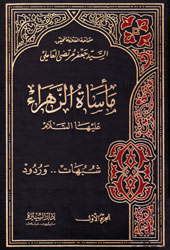
- Fatimid days are the days in which the Shiites hold mourning for the martyrdom of Fatima Al-Zahra (peace be upon her). They hold gatherings, mourning processions, and walk on foot for honorable scenes, and a number of Shiite authorities may participate in them. The day of her martyrdom was declared an official holiday in some Islamic countries, such as the Islamic Republic of Iran.
- Including the rebuilding of the historic Bani Hashem neighborhood, And Al-Baqi CemeteryAnd the house of Al-Zahra symbolically, and for the audience to feel the days that she (may God’s peace be upon her) lived.
- Establishing the Fatimid theater, similar to similes and theatrical scenes, in alleys, squares and public corridors in some countries, which is considered one of the special decrees on the day of her death (peace be upon her).
- The occasion of Al-Zahra’s birth (20 Jumada al-Akhira) is called Women’s Day in some Islamic countries, such as in Iran. On this day, the Iranian people celebrate by giving gifts to mothers and honoring them.
- Females in Shiite circles and Islamic countries are often called Fatima, Zahraa, and other titles, as in Iran, according to numbers and statistics.
Index of literature on it
There are many monuments and works about Lady Al-Zahra in different languages. It is divided into Musnads that were written down by the Shiites, virtues, biographies, and biographies
- Fadak in history by Mr. Muhammad Baqir al-Sadr
- Fadak and Al-Awali or the Seven Walls in the Qur’an, Sunnah, History and Literature by Sayyid Muhammad Baqir Al-Husseini Al-Jalali
- Al-Zahra, peace be upon her, the Lady of the Women of the Worlds, by Nasser Makarem Al-Shirazi
- Mrs. Fatima Al-Zahra, written by Muhammad Bayoumi Mahran
- The Glorious Word in Preferring Al-Zahra (peace be upon her) and the Wisdom of Revelation by Sayyid Abdul Hussein Sharaf Al-Din
- The Great Encyclopedia on Fatima Al-Zahra (peace be upon her), written by Ismail Al-Ansari Al-Zanjani
- Selective genetics of Fatima Al-Zahra (peace be upon her) by Sheikh Al-Sanad
- The Maqamat of Fatima Al-Zahra in the Qur’an and Sunnah by Sheikh Al-Sanad
- Fatima Al-Zahra, Mother of the Two Lions, written by Salman Hadi Al-Touma
- Evidence of Imamate by Ibn Jarir al-Tabari
- Virtues of Fatima Al-Zahra (peace be upon her) by Al-Tabari
- Explanation of establishing truth and eradicating falsehood by Sayyed Al-Marashi Al-Najafi
- Fatima Al-Zahra is a role model for Mr. Muhammad Taqi Al-Mudarresi
- Fatima Al-Zahraa, The Joy of the Chosen One’s Heart, by Ahmed Al-Rahmani Al-Hamdani
- The Darkness of Fatima al-Zahra by Mirza Jawad Tabrizi
- The Darkness of Fatima Al-Zahra by Sheikh Abdul Karim Al-Uqaili
- Musnad Fatima Al-Zahra, written by Aziz Allah Al-Attardi
- The book “The Birth of Fatima” by Sheikh Al-Saduq
- News of Fatima, her upbringing and birth, written by Muhammad bin Zakaria Al-Ghalabi
- The Fatimid Darkness by Al-Hasan bin Ali Al-Atrush
- History of Al-Yaqubi by Al-Yaqubi
- Among the many works and works of the Sunnis about Al-Zahra (peace be upon him), we can mention:
- “The Saqifa and Your Delegation” by Al-Jawhari Al-Basri
- “Who narrated on the authority of Fatima and her children” by Ibn Uqdah al-Jarudi
- “Musnad Fatima” by Dar Qatni Al-Shafi’i
- “The Smiling Gates in the Virtues of Lady Fatima” by Jalal al-Din al-Suyuti
- “Ithaf al-Sa’il min al-Fatima of Virtues and Virtues” by Ahmad bin Ali al-Qalqashandi al-Shafi’i.
References
- ↑
Abu Al-Saud, Muhammad bin Muhammad Emadi, Guiding the Sound Mind to the Advantages of the Holy Qur’an, Beirut, Arab Heritage Revival House, d. T.
Ibn Hanbal, Ahmad, Musnad Ahmad, Beirut, Dar Sader, D.T.
Ibn Tawus, Ali bin Musa, Jamal Al-Usbu’, edited by Jawad Al-Qayumi, Al-Afaq Foundation, 1371 A.H.
Ibn Asakir, Ali bin Al-Hassan, History of the City of Damascus, edited by Ali Shiri, Beirut, Dar Al-Fikr, 1415 AH.
Ibn Fahd Al-Hilli, Ahmed bin Muhammad, Iddah Al-Da’i and Najah Al-Sa’i, Beirut, Dar Al-Kitab Al-Arabi, 1407 AH.
Ibn Kathir, Ismail bin Omar, The Biography of the Prophet, edited by Mustafa Abdel Wahed, Beirut, Dar Al-Ma’rifa for Printing, Publishing and Distribution, 1293 AH.
Ibn Hajar Al-Asqalani, Ahmed bin Ali, Tahdheeb Al-Tahdheeb, Beirut, Dar Al-Fikr, 1404 AH.
Ibn Saad, Muhammad, The Great Classes, Beirut, Dar Sader, D.T.
Ibn Shahr Ashub, Muhammad bin Ali, Manaqib of the family of Abi Talib, explained and corrected by a committee of professors of Al-Najaf Al-Ashraf, Al-Najaf Al-Ashraf, Al-Haidariyya Library, 1376 AH.
Ibn Tawus, Ali bin Musa, Al-Taraif fi Ma’rifat sects of sects, Qom, Al-Khayyam, 1399 AH.
Ibn Abdul-Barr, Yusuf bin Abdullah, Assimilation in the Knowledge of Companions, edited by Ali Muhammad Al-Bajjawi, Beirut, Dar Al-Jeel, 1412 AH.
Ibn Abd Rabbuh Al-Andalusi, Ahmed bin Muhammad, Al-Aqd Al-Farid, Beirut, Dar Al-Kutub Al-Ilmiyyah, d. T.
Ibn Qutaybah al-Dinouri, Abdullah bin Muslim, Imamate and Politics, translated by Sayyed Nasser Tabatabai, Tehran, Qaqnus, 1380 AH.
Ibn Kathir, Ismail bin Omar, The Beginning and the End, edited by Ali Shiri, Beirut, Arab Heritage Revival House, 1408 AH.
Agha Buzurg Al-Tehrani, Muhammad Mohsen, Al-Dhari’a ila Shi’a Classifications, Beirut, Dar Al-Adwaa, 1403 AH.
Al-Alusi, Mahmoud bin Abdullah, Tafsir Al-Alusi (The Spirit of Meanings in the Interpretation of the Great Qur’an and the Seven Mathanis), edited by Ali Abdul Bari Atiya, Beirut, Dar Al-Kutub Al-Ilmiyyah, 1st edition, 1415 AH.
Al-Amini, Abdul-Hussein, Al-Ghadeer, D.M., D.N., D.T.
Al-Ansari Al-Zanjani, Ismail, The Great Encyclopedia on Fatima Al-Zahra, Qom, Evidence, 1st edition, 1428 AH.
Al-Irbali, Ali bin Issa, Kashf Al-Ghamma fi Ma’rifat Al-Imams, Qom, Radi, 1st edition, 1421 AH.
Al-Batnouni, Muhammad Labib, The Hejazi Journey, Cairo, Religious Cultural Library, D.T.
Al-Bahrani, Hashim bin Suleiman, Al-Burhan fi Interpretation of the Qur’an, Tehran, Al-Ba’ath Foundation, 1416 AH.
Al-Bahrani, Hashim bin Suleiman, Ghayat al-Maram and Hujjat al-Khasam, edited by Sayyed Ali Ashour, Qom, Islamic Knowledge Foundation, 1413 AH.
Al-Bukhari, Muhammad bin Ismail, Sahih Al-Bukhari, Dar Al-Fikr, 1401 AH.
Al-Baladhuri, Ahmed bin Yahya, Futouh al-Buldan, Beirut, Al-Hilal Library House, 1988 AD.
Al-Baladhuri, Ahmed bin Yahya, Ansab al-Ashraf, edited by Suhail Zakar and Riyad al-Zirkali, Beirut, Dar al-Fikr, 1417 AH..
Al-Balaghi, Sayyed Abd al-Hajjah, Hujjat al-Tafsir wa Balagh al-Ixir, Qom, Hikmat Publications, 1386 AH.
Al-Baydawi, Abdullah bin Omar, Lights of Revelation and Secrets of Interpretation, edited by Muhammad Abdul Rahman Al-Maraashli, Beirut, Arab Heritage Revival House, 1418 AH.
Al-Tirmidhi, Muhammad bin Isa, Sunan Al-Tirmidhi, edited by Abdul-Wahhab Abdul Latif, Beirut, Dar Al-Fikr, 1403 AH.
Al-Jawhari Al-Baghdadi, Abu Bakr, Al-Saqifa and Fadak, edited by: Muhammad Hadi Al-Amini, Nineveh Modern Library, D.M., D.T.
Al-Jawhari, Ahmed bin Abdul Aziz, Al-Saqifa and Fadak, edited by Muhammad Hadi Al-Amini, Beirut, Al-Kutbi Printing and Publishing Company, 1413 AH.
Al-Hamwi al-Juwayni, Ibrahim bin Muhammad, Fara’id al-Samtain fi the virtues of al-Murtada, al-Batoul, and the two grandsons and the imams from their descendants (peace be upon him), Beirut, al-Mahmoudi Foundation, 1400 AH.
Al-Himyari, Abdullah bin Jaafar, near the chain of transmission, Qom, Al-Bayt Foundation for the Revival of Heritage, 1413 AH.
Al-Khatib Al-Baghdadi, Ahmed bin Ali, History of Baghdad, edited by Mustafa Abdul Qadir Atta, Beirut, Dar Al-Kutub Al-Ilmiyyah, 1st edition, 1417 AH.
Al-Khwarizmi, Muwaffaq bin Ahmad, Al-Manaqib, edited by Malik Al-Mahmoudi, Qom, Islamic Publishing Foundation, 1411 AH.
Al-Dulabi, Muhammad bin Ahmad, The Pure Prophetic Offspring, edited by Sayyid Muhammad Jawad al-Husseini, Qom, Islamic publishing, 1407 AH.
Al-Dinuri, Ibn Qutaybah, Abdullah bin Muslim, Imamate and Politics, edited by: Ali Shiri, Qom, Al-Sharif Al-Radi, 1st edition, 1413 AH.
Al-Dhahabi, Muhammad bin Ahmed, Biographies of Noble Figures, edited by Shuaib Al-Arnaout, Beirut, Al-Resala Foundation, 1413 AH.
Al-Razi, Fakhr al-Din, Mafatih al-Ghayb or the Great Interpretation (Tafsir al-Razi), D.M., D.N., D.T.
Al-Rasas, Ahmed bin Hassan, Misbah Al-Ulum, edited by Murtada bin Zaid Al-Mahatwari, Al-Badr Scientific and Cultural Center, Sana’a, 1st edition, 1999 AD.
Al-Zamakhshari, Mahmoud bin Omar, Al-Kashfah fi Haqiqat Muzami’ al-Tanzeel (Tafsir Al-Zamakhshari), Beirut, Dar Al-Kutub Al-Arabi, 1407 AH.
Al-Subhani, Jaafar bin Muhammad Hussein, The Biography of Muhammadiyah, Beirut - Lebanon, Dar Al-Adwaa, 1423 AH.
Al-Samhoudi, Ali bin Ahmed, Wafaa Al-Wafa Akhbar Dar Al-Mustafa, Beirut, Dar Al-Kutub Al-Ilmiyyah, 1971 AD.
Al-Sahmi, Hamza bin Yusuf, Tarikh Gorgan, Beirut, Alam Al-Kutub, 4th edition, 1407 AH.
Al-Suyuti, Jalaluddin, Al-Durr Al-Manthur fi Al-Tafsir bi Al-Mathour, Qom, Library of Ayatollah Al-Marashi Al-Najafi, 1404 AH.
Al-Shami, Yusuf bin Hatem, Al-Durr Al-Nazim fi Manaqib Al-Imam Al-Lahamim, Iran - Qom, Jamiat Al-Mudarin, 1st edition, 1420 AH.
Al-Shahrastani, Muhammad bin Abdul Karim, Al-Milal wal-Nihal, edited by Muhammad Sayyid Gilani, Beirut, Dar Al-Ma’rifa, 1422 AH.
The Second Martyr, Zain Al-Din Bin Ali, Al-Rawdah Al-Bahiyya fi Sharh Al-Lam’a Al-Dimashqiya, edited by Sayyed Muhammad Kalantar, Qom, Dauri Publications, 1410 AH.
Al-Shahidi, Jafar, Zindgani Fatima Zahra (peace be upon her) (in Persian), Tehran, Farhanak-e-Islami publication book, 1363 AH.
Al-Shushtari, Qadi Nour Allah, Establishing Truth and Destroying Falsehood, Qom, Ayatollah Al-Marashi Library, 1st edition, 1409 AH.
Al-Shirazi, Makarem Nasser, Tafsir Namouneh, Tehran, Dar Al-Kutub Al-Islamiyyah, 1374 AH.
Al-Saduq, Muhammad bin Ali, Al-Amali, Qom, Printing and Publishing Center at the Mission Foundation, 1st edition, 1417 AH.
Al-Saduq, Muhammad bin Ali, Al-Khasal, edited by Ali Akbar Al-Ghafari, Qom, Islamic publishing, 1403 AH.
Al-Saduq, Muhammad bin Ali, Illal al-Shara’i’, edited by Sayyid Muhammad Sadiq Bahr al-Ulum, Al-Najaf Al-Ashraf, Al-Haidariyya Library, 1385 AH.
Al-Saduq, Muhammad bin Ali, Uyun Akhbar Al-Rida, corrected and commented by Sheikh Hussein Al-Alami, Beirut, Al-Alami Publications Foundation, 1404 AH.
Al-Saduq, Muhammad bin Ali, Maani Al-Akhbar, corrected and commented by Ali Akbar Al-Ghafari, Qom: Islamic Publishing Foundation, 1379 AH.
Al-Saduq, Muhammad bin Ali, Man Layahdhuruh al-Faqih, edited by Ali Akbar al-Ghafari, Qom, Islamic Publishing, 1404 AH.
Al-Saffar, Muhammad bin Hassan, Basa’ir al-Darajat al-Kubra, edited by Mirza Mohsen Koja Baghi, Tehran, Al-Alami Foundation, 1404 AH.
Al-Tabatabai, Muhammad Hussein, Al-Mizan fi Tafsir Al-Qur’an, Qom - Iran, Dar Al-Mujtaba, 1st edition, 1430 AH.
Al-Tabatabai, Muhammad Hussein, Al-Mizan in the Interpretation of the Qur’an, Qom, Islamic Publishing Foundation, 1417 AH.
Al-Tabatabai, Muhammad Kazem, “The Double of Fatima,” Danshnameh of Fatimi (S), Tehran, publications of the Islamic Revolution, 1393 AH.
Al-Tabarsi, Ahmed bin Ali, Al-Ihtijaj, edited by Muhammad Baqir Al-Khurasan, Al-Najaf Al-Ashraf, Dar Al-Numan, 1386 AH.
Al-Tabarsi, Al-Hasan bin Al-Fadl, Alam Al-Wari, Qom, Al-Bayt Foundation for the Revival of Heritage, 1417 AH.
Al-Tabarsi, Al-Hasan bin Al-Fadl, Makarim Al-Akhlaq, Qom, Al-Sharif Al-Radi, 1392 AH.
Al-Tabarsi, Al-Fadl bin Al-Hassan, Al-Bayan Complex, Beirut - Lebanon, Al-Alami Publications Foundation, 1st edition, 1415 AH / 1995 AD.
Al-Tabari, Ahmed bin Abdullah, Al-Uqabi’s Relics in the Manaqib of the Relatives, Cairo, Al-Qudsi Library, 1356 AH.
Al-Tabari, Muhammad bin Abi Al-Qasim, Bishara Al-Mustafa for the Shiites of Al-Murtada, edited by Jawad Al-Qayumi, Qom, Islamic Publishing Foundation, 1420 AH.
Al-Tabari, Muhammad bin Jarir, The History of Al-Tabari, edited by Majd Abu Al-Fadl Ibrahim, Beirut, Dar Al-Turath, 2nd edition, 1378 A.H.
Al-Tabari, Muhammad bin Jarir, History of Al-Tabari, edited by Grohi Az Danshmandan, Beirut, Al-Alami Foundation, 1403 AH.
Al-Tabari, Muhammad bin Jarir, Evidence of the Imamate, Qom, Mission Foundation, 1413 AH.
Al-Tehrani, Mojtaba, Research Kotah Bayramun Sermon of Hazrat Zahra (S) (in Persian), Tehran, Payam Azadi, 1378 AH.
Al-Tusi, Muhammad bin Al-Hasan, Ikhtiyar Ma’rifat Al-Rijal, edited by Sayyed Mehdi Raja’i, Qom, Al-Bayt Foundation for the Revival of Heritage, 1404 AH.
Al-Tusi, Muhammad bin Al-Hasan, Al-Amali, verified by the Mission Foundation, Qom, House of Culture, 1414 AH.
Al-Tusi, Muhammad bin Al-Hasan, Al-Tibyan fi Tafsir Al-Qur’an, edited by Ahmed Qasir Al-Amili, Maktab Al-I’lam Al-Islami, 1409 AH.
Al-Tusi, Muhammad bin Al-Hasan, Misbah Al-Mutahjad, Beirut, Shiite Jurisprudence Foundation, 1411 AH.
Al-Alami, Ali Reza, Poems of Fatima (peace be upon her), Danashnameh Fatimi (peace be upon her), Tehran, Publishing Institution affiliated with the Center for Islamic Cultures and Thought, 1393 AH.
Al-Amili, Jafar Murtada, Ranjha Hazrat Zahra (S), translated by Muhammad Sepehri, Qom, Tahzib Publications, 1382 AH.
Al-Askari, Mortada, Saqifa: A formal grammar of the government of the world (in Persian), by Koush Mahdi Dashti, Qom, Faculty of Fundamentals of Religion, 1378 AH.
Al-Ayyashi, Muhammad bin Masoud, Tafsir Al-Ayyashi, Correction and Commentary: Al-Sayyidhashem Al-Rasouli Al-Mahallati, Islamic Scientific Library, Tehran, 1st edition, 1380 AH.
Al-Fattal Al-Nayshaburi, Muhammad bin Al-Hassan, Rawdat Al-Wazeen, Qom, Al-Sharif Al-Radi, D.T.
Al-Fakhr Al-Razi, Muhammad bin Omar, Al-Tafsir Al-Kabir, Beirut, Dar Ihya’ Al-Tarath Al-Arabi, 1420 AH.
Al-Maliki, Ali bin Muhammad, Important Chapters in the Knowledge of the Imams, Qom, Dar Al-Hadith, 1st edition, 1309 AH.
Al-Muttaqi Al-Hindi, Ali bin Hussam, Kanz Al-Ummal, Beirut, Al-Resala Foundation, D.T.
Al-Majlisi, Muhammad Baqir bin Muhammad Taqi, Bihar Al-Anwar, Al-Wafa Foundation, Arab Heritage Revival House, Beirut, 1403 AH.
Al-Muhaqqiq Al-Sabzwari, Muhammad Baqir, Namuna Baynat der Shalan Revelation of Verses from the View of Sheikh Tusi and other special and general commentators, Tehran, Islamic, 2nd edition, 1359 AH.
Al-Mahallati, Zabihullah, Riyahin al-Sharia, Tehran, Dar al-Kutub al-Islamiyyah, d.d.
Al-Mudarresi, Muhammad Taqi bin Muhammad Kazem, Fatima Al-Zahra, peace be upon her, a role model and role model, Lebanon - Beirut, the center of the era, 1431 AH.
Director Shana Ji, Kazem, Hadith Science, Mashhad, Danishgah Publications, Mashhad, 1344 Sh.
Al-Murtada, Ali bin Al-Hussein, Al-Shafi fi Imamate, edited by Sayyed Abdul-Zahra Al-Husseini, Qom, Ismailian Publications, 1410 AH.
Al-Marashi, Shihab Al-Din, Sharh Ihqaq Al-Haqq, Qom, Al-Marashi Al-Najafi Library, d. T.
Al-Masoudi, Ali bin Al-Hussein, Proof of the Will of Imam Ali bin Abi Talib, Qom, Ansarian Publications, 1417 AH.
Al-Masoudi, Muhammad Fadel, Fatimid Secrets, edited by Sayyed Adel Alawi, Al-Za’ir Foundation, 1420 AH.
Al-Mu'tazili, Ibn Abi Al-Hadid, Explanation of Nahj Al-Balagha, edited by: Muhammad Abu Al-Fadl Ibrahim, Beirut, Dar Al-Kutub Al-Ilmiyyah, Beirut, D.T.
Al-Maamouri, Ali, Katabshnasi Fatima (in Persian), Danshnameh Fatimi, Tehran, Institute of Islamic Cultural and Intellectual Studies, 1st edition, 1393 AH.
Al-Maghribi, Noman bin Muhammad, The Pillars of Islam, edited by Asif Faizi, Cairo, Dar Al-Maaref, 1383 AH.
Al-Maghribi, Numan bin Muhammad, Sharh al-Akhbar fi Virtues of the Pure Imams, edited by Sayyed Muhammad Husseini al-Jalali, Qom, Islamic publishing, 1414 AH.
Al-Mufid, Muhammad bin Muhammad, Al-Irshad fi Knowing God’s Proofs upon His Servants, Qom, Sheikh Al-Mufid Conference, 1413 AH.
Al-Mufid, Muhammad bin Muhammad, specialty, edited by: Ali Akbar al-Ghafari, Qom, Islamic publishing, 1414 AH.
Al-Mufid, Muhammad bin Muhammad, Al-Muqannah, Qom, Islamic Publishing Foundation, 2nd edition, 1410 AH.
Al-Mufid, Muhammad bin Muhammad, The Path of Sharia in the Brief History of Sharia, edited by: Mahdi Najaf, Beirut, Dar Al-Mufid, 1414 AH.
Al-Mufid, Muhammad bin Muhammad, Al-Amali, edited by Hussein Ustad Wali, Ali Akbar Al-Ghafari, Beirut, Dar Al-Mufid, 1414 AH.
Al-Maqrizi, Ahmed bin Ali, Enjoyment of Listening, edited by Muhammad Al-Numaisi, Beirut, Dar Al-Kutub Al-Ilmiyya, 1420 AH.
Al-Mirjhani, Muhammad Hassan, Jannat Al-Asimah, Tehran, Al-Sadr Library, 1398 AH.
Al-Nasa’i, Ahmad bin Shuaib, Al-Sunan Al-Kubra, edited by Abdul Ghaffar Suleiman Al-Bandari and Al-Sayyid Kasravi Hassan, Beirut, Dar Al-Kutub Al-Ilmiyya, 1411 AH.
Al-Numairi, Omar bin Shibah Ibn Shibah, History of Medina, edited by Fahim Muhammad Shaltut, Qom, Dar Al-Fikr, 1410 AH.
Al-Naysaburi, Al-Hasan bin Muhammad, Interpretation of the Oddities of the Qur’an and the Oddities of the Criterion, edited by Zakaria Amirat, Beirut, Dar Al-Kutub Al-Ilmiyya, 1416 AH.
Al-Naysaburi, Muhammad bin Abdullah, Al-Mustadrak Ali Al-Sahihayn, edited by Mustafa Abdul Qadir Atta, Beirut, Dar Al-Kutub Al-Ilmiyya, 1411 AH.
Al-Naysaburi, Muslim bin Al-Hajjaj, Sahih Muslim, Beirut, Dar Al-Fikr, ed.
Al-Hilali Al-Amiri, Salim bin Qais, The Book of Salim bin Qais, edited by Muhammad Baqir Al-Ansari, Qom, Al-Hadi Publishing, 1420 AH.
Al-Waqidi, Muhammad bin Omar, Al-Maghazi, edited by Marsden Jones, Beirut, Al-Alami, 1409 AH.
Al-Kafami, Ibrahim bin Ali, Al-Misbah, Beirut, Al-Alami Foundation, 1403 AH.
Al-Kulayni, Muhammad bin Yaqoub, Al-Kafi, edited by Ali Akbar Al-Ghafari, Tehran, Dar Al-Kutub Al-Islamiyyah, 3rd edition, 1388 AH.
Al-Yaqoubi, Ahmed bin Ishaq, History of Al-Yaqoubi, Dar Sader, Beirut, ed.
Tari, Jalil, The Facts of the Shed in the Study of Abu Mikhnaf’s Novel, Translated by: Ahmad Al-Fadil, Iran, The International Council of Ahl al-Bayt, 1st edition, 1427 AH.
Farahmandpour, Fahima, Biography of the Politician of Fatima (Danshnameh Fatimi), Tehran, Farhang and Andisheh Islami, 1st edition, 1393 AH.
Kahhala, Omar Reda, Notable Women in the Arab and Islamic Worlds, Beirut, Al-Resala Foundation, 10th edition, 1412 AH.
